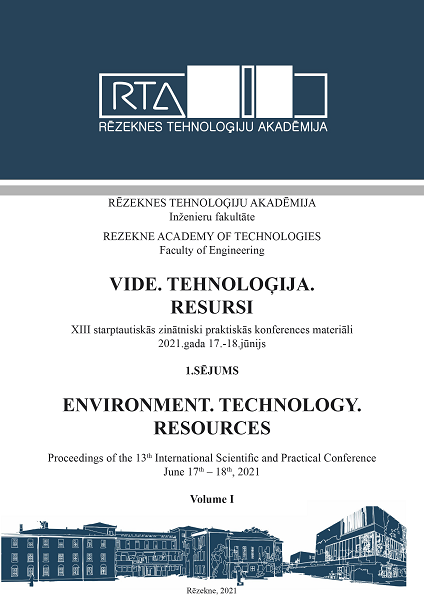RESEARCH OF BIOMASS MICRO-COGENERATION SYSTEM INTEGRATION WITH A SOLAR PV PANELS IN ZERO-ENERGY FAMILY BUILDING
DOI:
https://doi.org/10.17770/etr2021vol1.6568Keywords:
Efficiency, environmental impact, micro-cogeneration, off-grid, sustainabilityAbstract
Nowadays, any economic development is based on its sustainability. On the other hand, sustainability of the economy is no longer conceivable without efficient use of resources. Climate change and environmental degradation affects everybody and have no borders. It is essential, that all countries, regardless of their existing resources, are involved in environmental matters. The European Union (EU) has taken the initiative and has seen the possibility of transforming climate change into a guiding theme for sustainability and development in the economy. The EU has developed a green policy in order to transform all economic sectors into sustainable use of resources. EU is planning to achieve climate neutralisation in all sectors of the economy by year 2050. In order to achieve this objective, only the transformation of the industrial, transport and energy sectors will not be sufficient. The activity and willingness of each individual to achieve these objectives at their own household level will be crucial. It should change habits in all sectors important for households: food, transport, waste management and decreasing energy consumption in all mentioned sectors. Solar PV panels traditionally are used to reach zero balance, but taking in to account climatic conditions and seasonable solar irradiation activity, they can operate successfully during the summer and partly during the spring and autumn season. During the heating season, the efficiency of solar PV panel systems is very low. Use of innovative micro-cogeneration equipment producing both heat and electricity is more efficient during heating season in Latvia.
In this paper case study of innovative biomass Stirling engine micro-cogeneration system integration with a solar PV panels in zero-energy family building will be present.
References
Central Statistical Bureau, “Environment and Energy, Energy - Household Energy Consumption” [Online]. Available: http://data1.csb.gov.lv/pxweb/en/vide/vide__energetika__energ_pat/ [Accessed: Mar. 08, 2021].
R. Padinger, et al, Best practise report on decentralized biomass fired CHP plants and status of biomass fired small- and micro scale CHP technologies. IEA Bioenergy, 2019.
MAGA, “Wood-gasifying boilers MA” [Online]. Available: https://magasro.sk/en/wood-and-brickets-boilers-d/wood-gasifying-boiler [Accessed: Mar. 10, 2021].
Microgen Engine, “Microgen’s compact gas fired Heater-Generator,” Techn. Paper. [Online]. Available: http://stirling-tech.com/wp-content/uploads/2018/05/ThermoGen1.0kW.pdf [Accessed: May 15, 2018].
Central Statistik Bureau Databases, “Overall description of dwellings (%)” [Online]. Available: http://data.csb.gov.lv/pxweb/en/sociala/sociala__majapst/MTG020.px/ [Accessed: Mar. 15, 2021].
D. Kostova, et al, “D2.2 Report on EPC best practices,” QualDelEPC, Goteborg, Sweden, Rep., 2020.
Cabinet of Ministers Republic of Latvia, “Cabinet Regulation No. 280. Regulations Regarding the Latvian Construction Standard LBN 002-19, Thermotechnics of Building Envelopes,” Latvijas Vēstnesis, vol. 135, 2019.
Cabinet of Ministers Republic of Latvia, “regulation No. 204. On the conditions of heat supply,” Latvijas Vēstnesis, vol. 125, 1994. (in Latvian)
LVGMC, “Latvian climate” [Online]. Available: https://videscentrs.lvgmc.lv/lapas/latvijas-klimats [Accessed: Mar. 15, 2021]. (in Latvian)
L. Rozentale, D. Lauka, D. Blumberga, “Accelerating power generation with solar panels. Case in Latvia,” Energy Procedia, vol. 147, pp. 600–606. https://doi.org/10.1016/j.egypro.2018.07.077
I. Pakere, D. Blumberga, “Solar power or solar heat: What will upraise the efficiency of district heating? Multi-criteria analyses approach”, Energy, vol. 198, pp. 117291, May 2020.
A. Simola, et al, “Optimal dimensioning of a solar PV plant with measured electrical load curves in Finland,” Solar Energy, vol. 170, pp. 113–123, Aug. 2018.
J. Telicko, D. Heincis, A. Jakovics, “A study of solar panel efficiency in Latvian climate conditions,” Proceedings of the 12th Nordic Symposium on Building Physics, vol. 172, pp. 16007, Jun. 2020.
Cabinet of Ministers Republic of Latvia, “Facilitated conditions for net system users,” April 2020 [Online]. Available: https://www.mk.gov.lv/lv/jaunums/atviegloti-nosacijumi-neto-sistemas-lietotajiem [Accessed: Mar. 14, 2021]. (in Latvian)
K. N. Nwaigwe, P. Mutabilwa, E. Dintwa, “An overview of solar power (PV systems) integration into electricity grids,” Materials Science for Energy Technologies, vol. 2, iss. 3, pp. 629–633, Dec. 2019.
The Weekend Australian, A. Hepworth, “Rooftop solar panels overloading electricity grid,” October 2011 [Online]. Available: https://www.theaustralian.com.au/news/rooftop-solar-panels-overloading-electricity-grid/news-story/5ea583571dde0830ec34d3cd8c32b9dc [Accessed: Mar. 01, 2021].
BUILD, “Rapid increase in solar installations potentially overloading the grid” [Online]. Available: https://build.com.au/rapid-increase-solar-installations-potentially-overloading-grid [Accessed: Mar. 14, 2021].



